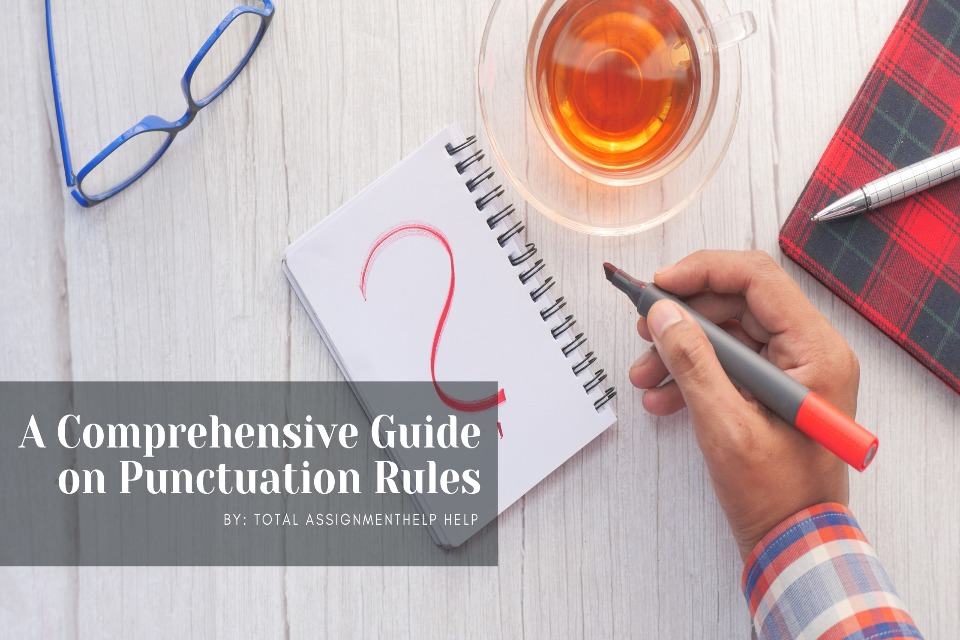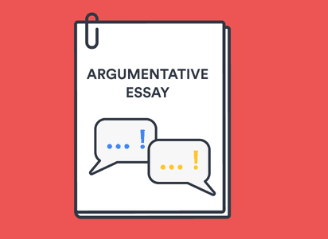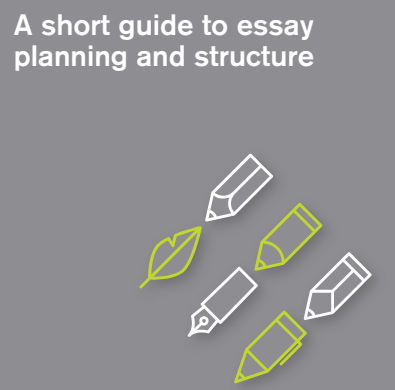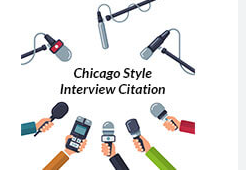A Comprehensive Guide on Punctuation Rules

Punctuation is the foundation of effective language, and it may help you get the most out of your work. English punctuation rules will add clarity to words when used correctly, allowing your writing to stick out amid the crowd. You might be surprised to learn that any well-researched paper might get a poor grade. Even if you write an essay with many details, if you don’t punctuate correctly, you might lose a lot of points. Punctuation rules improve your work, whether it’s prose or poetry.
If you want to see your efforts reap the results, you must take every step to guarantee that your paper earns excellent grades.
To Write a Perfect Assignment, Follow These Punctuation Rules
Punctuation may offer a lot of quality to your writing if you want your lecturer to understand what you’re saying. So if you’re still committing frequent punctuation errors, these are the most critical punctuation rules you should be following RIGHT NOW!
Apostrophe use
Recollect your pronoun lessons about punctuation and how they helped you detect the possessive pronoun clause? Nowadays, most students forget to utilise the apostrophe when indicating a possessive form
—for example, Rahul’s guitar, John’s hat, etc.
And that’s not the end of it! The apostrophe can also be used to abbreviate words, such as “he is” is written as “he’s“, and “they have” is written as “they’ve“. Students understand how to use these terms in possessive and constrictive forms, but they employ the apostrophe incorrectly in plural forms. So, for example, instead of “Morgen’s“, it should be “We are dining with the Morgens.”
There is, however, one exception to this law. The plurals of abbreviations like PhD’s and M.D.’s can be indicated with an apostrophe.
For quotes, use the correct punctuation rule.
You’re probably aware of applying quotation marks to indicate verbatim or direct remarks said by a person. You frequently use a famous person as a source of inspiration in your work. While utilising quotation marks improves the readability of your work, it hurts your scores. The essential punctuation requirement for quotations is that full stops and commas must be used inside them.
“I’d want to go to the picnic with dad, if Dan isn’t there.” for instance.
Notice how the comma and period are placed within the quotation marks in the instance seen above. The punctuation rule is not to use the period outside the “quotes” once you’ve closed the conversation quotes.
Distinguish between semi-colons and colons.
Both colons and semi-colons may be used to link two separate sentences, which is a commonality between the two punctuation marks. However, there are particular distinctions in how you use them.
Semi-colons are used to divide two related but distinct ideas. For example, if you don’t want to split a notion into two different sentences, semi-colons can be used instead of a period.
For instance: I’m delighted you came; we expected to see you.
You can see how a period may have been helpful in the preceding statement. The semi-colon separates two-sentence pieces, which can be thought of as two different complete sentences.
On the other hand, a colon can be used to make a list. A colon is required when a clause in a sentence clarifies the second clause.
For example: Remember to bring the following items to the beach: Towel, sunscreen, sunglasses, and a beach chair.
Comma punctuation rule
Commas are used after, but not before, phrases or sentences that describe the main clause, as per English punctuation rules.
For instance, the right expression is: Someone rang the doorbell while I was sleeping.
Someone rang the doorbell, while I was sleeping, on the other hand, is inaccurate. In this scenario, the comma should be omitted.
After opening words like “yeah“, “well“, and “however“, commas must be used.
For instance, “Yeah, we will undoubtedly assist you.”
Commas are also used after names when addressing someone.
For instance, “Ryan, go fetch the groceries.”
Hyphens vs dashes.
Perhaps professional writers are sometimes stumped when asked to explain the difference between a hyphen and a dash. Hyphens are used to designate complicated adjectives according to fundamental punctuation standards. Whenever two or more words have been used as an adjective together, a hyphen is used to connect them. Also, keep in mind that a hyphen has no spaces.
“A well-written document”, for example, or “high-quality information”.
There is, nevertheless, an exception to this punctuation rule. The words must not be hyphenated if the first word is an adverb that ends with –ly.
“We have highly qualified specialists working for us.”
You cannot use a hyphen to join the words ‘highly’, and ‘qualified’ in the above phrase since highly is an adverb, not an adjective.
As previously mentioned, a dash is used to denote a different concept or stream of thought inside the same phrase. It’s a bit longer than a hyphen. Unlike a hyphen, it is used with spaces before and after that portion of the phrase.
Question marks and exclamation marks
Stick to the Punctuation Rules
You would have asked the adults around you many questions since you were a youngster. Are you, however, aware of the punctuation guideline that requires you to use a question mark in your writing? What if we told you there was more to it than you could ever imagine? Continue reading to learn about this punctuation rule.
What is the best way to utilise the question mark?
Do you know how to put a question mark in a sentence? What you truly understand is insufficient.
Take a look at the two sentences below. You’ll notice that one phrase has a question mark at the conclusion, while the other has a period. Owing to the inclusion of “what“, some people may misinterpret the second sentence as a question and finish the sentence with a question mark.
Example 1: Do you have any knowledge of Indian Independence?
Example 2: She inquired about his knowledge of the Indian Independence.
Instance 1 is a direct query, but case 2 is an indirect speech inquiry. When a question appears in indirect speech, it is followed by a period.
Occasionally, a phrase will appear to be a question.
For instance, I’m curious how many people will be attending the party.
Rest of the statement (how many people will be attending the party) seems like a query if the “I wonder” is removed. However, it is a reflective statement and should not be misconstrued as a question.
What is the best way to utilise the exclamation mark?
When speaking passionately, exclamation marks are used. It expresses astonishment, amazement, and other strong emotions. With the popularity of “SMS language,” millennials make the error of adding unnecessary exclamation marks. It’s important to remember that using too many exclamation marks isn’t required.
For instance, our team is the best! We have the best prices! Now is the time to hire us!
The preceding line is a classic case of exclamation mark excess.
The proper phrase is: Our team is the best, and we have the best prices. So now is the time to hire us!
Ensure that you don’t follow the exclamation mark with a period or any other punctuation mark, as you would with a question mark.
Become Error-Free
Are you unsure whether to write ‘Ph.D.’ or ‘PhD’? Is it a case of ‘its’ or ‘it’s’? You may become perplexed due to the vastness and complexity of English punctuation rules. If you are unsure about the application, you should check a dictionary. Furthermore, poetry punctuation standards may differ from those used in essays. The punctuation rules might differ even among a heading and a title. In such instances, the best help ought to be a dictionary. You can utilise the classic Oxford, Cambridge, and Collins dictionaries. Alternatively, use the Merriam Webster and Urban dictionaries online.
Punctuation Rules That Work
You can use a comma to provide further information about the sentence’s topic without modifying the entire meaning of the phrase. When you use commas in a sentence, it helps your reader comprehend how vital the information is.
For instance, the playwright, a musician, died peacefully in her sleep this night.
The reader realises that the extra information about the playwright being a musician isn’t that relevant in the previous statement.
Take, for example, this sentence: Michael Jackson, the musician, was the event’s primary guest.
The musician’s name is crucial to interpreting the statement in the preceding line. You must follow such punctuation rules; otherwise, there’d be no way of knowing which of the several musicians is mentioned.
You may also perform the same thing using a dash (-). A dash is generally used instead of conjunction to render sentences easier to grasp.
For example, I adore delicious pastries – even though they make me fat – since I have a sugar craving.
Frequently Asked Questions
What is punctuation?
Punctuation is a set of marks or symbols used to demonstrate how a phrase is put together and interpreted.
What is the importance of punctuation rules?
Following punctuation rules is necessary for communicating and clarifying the meaning of written language.
What is the best source of information regarding punctuation rules?
The English dictionary is considered to be the standard when it comes to understanding punctuation rules.
Total Assignment Help
Incase, you are looking for an opportunity to work from home and earn big money. TotalAssignmenthelp Affiliate program is the best choice for you.
Do visit :https://www.totalassignmenthelp.com/affiliate-program for more details
Total Assignment help is an assignment help Online service available in 9 countries. Our local operations span across Australia, US, UK, South east Asia and the Middle East. With extensive experience in academic writing, Total assignment help has a strong track record delivering quality writing at a nominal price that meet the unique needs of students in our local markets.
We have specialized network of highly trained writers, who can provide best possible assignment help solution for all your needs. Next time you are looking for assignment help, make sure to give us a try.
Looking for Assignment Help from Top Experts ?
Get the best Assignment Help from leading experts from the field of academics with assured onetime, 100% plagiarism free and top Quality delivery.



